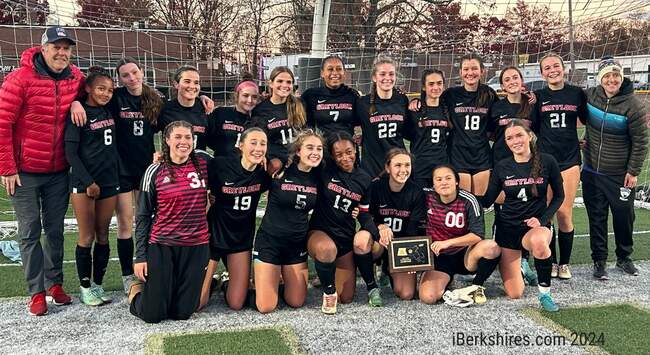
Two Down: Adams Town Meeting Moves Hoosac Project
  Selectwoman Paula Melville and former selectman George Haddad, left, were opposite sides of the issue but both urged town meeing to think of the children of Adams when they voted. Selectwoman Paula Melville and former selectman George Haddad, left, were opposite sides of the issue but both urged town meeing to think of the children of Adams when they voted. |
Still, the vote of 103-10, far beyond the needed 2/3 majority, sent a whoop of applause through the spectators in the dark auditorium at Plunkett Elementary School on Tuesday night.
The applause had actually begun earlier, when the overwhelming majority of the town meeting members seated in the center aisles stood to be counted.
This was the second vote the $40.5 million project had to pass; the first was Monday night in Cheshire, where it was approved by a similar margin. The matter know goes to ballot box, with voting in Adams on Thursday and Cheshire on Saturday to approve a Proposition 2 1/2 debt exclusion.
Adams town meeting members, however, were more vocal in both their support and opposition to the project that will cost the town at least $8.6 million and relocate the middle school to the high school.
Several speakers brought up many of the same issues raised at previous information meetings — the inclusion of refurbishing recently fixed athletic fields and track, the use of a (slightly pitched) flat roof, the cost of LEED certification.
Francis Waterman, co-chairman of the building committee, tried to answer each point (the track hadn't been fixed but sealed, the roof had just been redone, and the LEED aspects while expensive could actually mean a return on energy costs within a decade). Some factors, such as a second gym for the middle school wing, are mandated by the state, he said.
John R. Cowie Jr., representing Precinct 3, expressed skepticism about the LEED pay back and frustration that the towns hadn't had more options. If the town had to spend $8.6 million, it should be cutting somewhere, he continued. "If times are tough you tighten the belt. Why is it every time there's a project proposed by a public body they say they can't [cut back]."
"I leave it to yourself to make up your own minds on the matter, but remember that you represent a precinct," Cowie told the meeting members.
Jeffrey Lefebvre of Precinct 2 said voters had to remember they weren't spending $8.6 million but more like $14 million with interest. And he wasn't convinced it was do or die — there's time to reconsider, he insisted, without losing state funding.
|
James J. Fassell, Precinct 5, said everyone was looking at the wrong way. "We all ask how much it's going to cost. I always ask how much money is going to come into our town. ... We have an opportunity to bring $28.5 million into this community."
Former selectman George Haddad, also representing Precinct 5, said the town had to think of the needs of the kids. Besides, he continued, "whatever we do, we're going to have to pay ... for this project or the next one."
Selectwoman Paula Melville, a strong opponent of relocating the middle school students, made a final impassioned plea to vote the project down and prevent the loss of "another neighborhood school."
"We're making a monumental decision here," she said. "We are being asked to invest millions of state and local taxes into something that we don't own ... Do you want to give up Memorial?"
She argued it would be cheaper to build an elementary school to alleviate the overcrowding and alluded to the statement of interest submitted last year for Cheshire Elementary School's hoped-for renovation as proof of a plan to ship Adams children to Cheshire. Cheshire's statement referred to the Adams sixth-graders becoming elementary students; the Hoosac project has them at the high school.
"Let's not make this a monumental mistake," she said. "we have to do right by our kids .... please vote no."
Tuesday night Melville lost but as everyone prepared to leave, one voice reminded everone: "see you at the ballot box."
In other business, town meeting also approved the friendly taking of a parcel land at Columbia Memorial Park. The land had once been owned by Berkshire Cotton Manufacturing, now Berkshire Hathaway and conveyed to the town in 1916 but not properly recorded. National Grid, which had demolished and cleaned an electrical station there, found the ambiguity during a title search.
Berkshire Hathaway wants nothing to do with the land, not even to touch the deed, but has agreed to sign a release if the town will take it. Town Counsel Edmund St. John III said the votes authorize the Selectmen to take action but that won't happen until Berkshire Hathaway signs the release ensuring it won't sue or otherwise renege on the deal.















